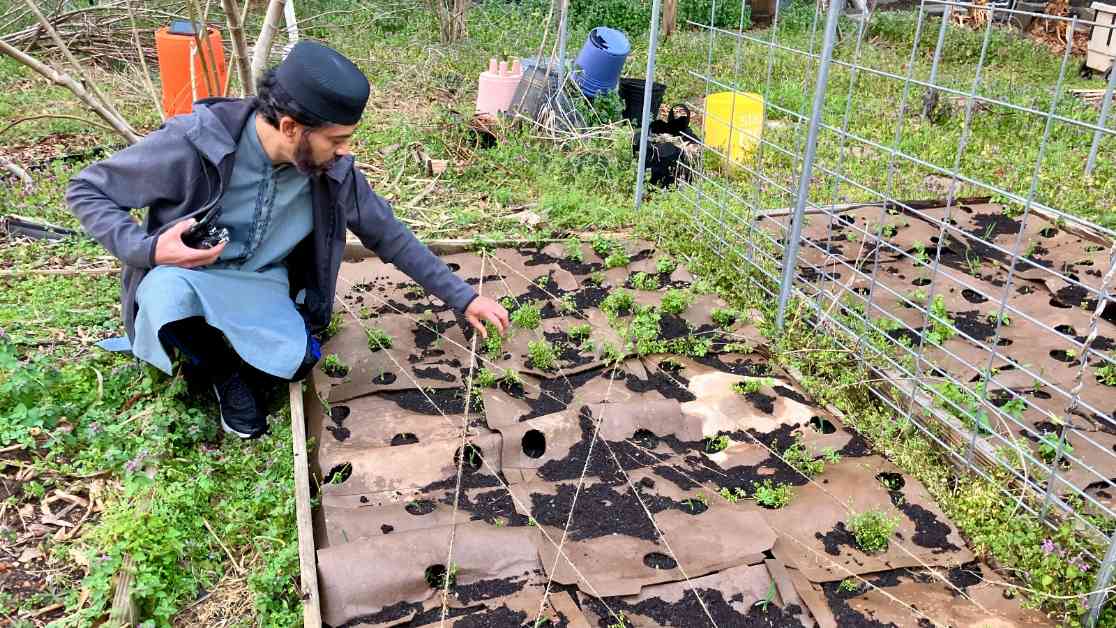Atlanta Mosques Embrace Sustainability During Ramadan
As the sun sets in Stone Mountain, Georgia, Nina Ansari contemplates the untouched plate of rice left on the mosque floor. Surrounded by uneaten pizza and curry leftovers that her kids didn’t finish, she faces a common dilemma in the Muslim community during Ramadan: food waste. Nina, a Georgia native, is all too familiar with the surplus of trash that accumulates in mosques during the holy month. Ramadan is a time of spiritual growth, marked by increased prayer and fasting from dawn until dusk. Masjids often cater to hundreds of visitors for the iftar, or evening meal, and suhoor, the predawn meal before fasting begins.
The abundance of food and disposable plates during these meals can lead to overflowing trash cans and half-full plates left behind. For Nina, waste during Ramadan is a stark contrast to her family’s values of conservation and mindfulness. She reflects, “My family is conscious of water and food conservation. We eat leftovers — we are not wasting or being snooty about wasting.”
The Issue of Food Waste in Ramadan
The problem of food waste during Ramadan is not unique to Stone Mountain. Across Atlanta, mosques and Islamic groups are taking steps toward eco-friendly practices to reduce waste. This year, over two dozen masjids are planning “zero-waste iftars” to minimize discarded food, disposable plates, and plastic water bottles. The issue of food waste is not only a local concern but a global and national dilemma. In the United States, nearly 40% of the food supply ends up in landfills, highlighting the urgency of sustainable practices.
Marium Masud, a member of Marietta’s Masjid Al Furqan West Cobb Islamic Center, emphasizes the religious imperative to be stewards of the Earth. Quoting a saying from the Prophet Muhammad that the Earth is a masjid, Masud stresses the importance of cleanliness and sustainability in keeping with Islamic teachings.
Green Initiatives at Al Furqan
At Masjid Al Furqan, a dedicated “green team” of 17 volunteers has made significant strides in promoting sustainable practices. Faced with the challenge of disposing of nearly 300 plastic water bottles each night, the green team took action to eliminate plastic waste. By introducing water filling stations, reusable five-gallon water bottles, and selling recycled aluminum bottles to community members, Al Furqan successfully reduced its plastic waste output. The initiative not only benefits the environment but also aligns with the mosque’s commitment to ethical stewardship.
Partnering for Sustainability
In partnership with Georgia Interfaith Power and Light (GIPL), Al Furqan is set to host its first “zero-waste iftar” to further promote sustainability. GIPL, a nonprofit organization focusing on environmental justice, provides training, workshops, and grants for reusable or compostable materials. Additionally, GIPL covers the cost of composting excess food waste from iftar dinners, reinforcing the importance of waste reduction and resource conservation.
Expanding Eco-Friendly Practices
Al Furqan’s zero-waste iftar is part of a broader movement across Atlanta’s Islamic centers to embrace sustainability during Ramadan. With at least 15 masjids now equipped with green teams, the shift towards eco-conscious practices marks a significant change from previous years. Masjid Roswell Community Masjid (RCM), for instance, has partnered with Goodr to handle composting and food waste recovery services year-round, setting a precedent for sustainable initiatives in the community.
Championing Sustainability at the Grassroots Level
Mohammed Ata Ur Rasheed, a dedicated volunteer at Masjid Fatimah in Stone Mountain, is at the forefront of reducing waste during Ramadan. By monitoring trash disposal and encouraging smaller food portions, Rasheed plays a crucial role in educating congregants about the importance of waste reduction. His efforts have not only saved the masjid money but also inspired others to adopt sustainable practices in their homes.
Inspiring Change Through Action
Ayesha Abid, the program coordinator for Georgia Interfaith Power and Light, emphasizes the power of community-driven change in promoting sustainability. Abid’s work with Muslim organizations to embrace recycling and energy conservation reflects a growing awareness of environmental issues within religious communities. By fostering a culture of stewardship and responsibility, mosques like Atlanta Masjid of Al-Islam are leading the way in sustainable practices during Ramadan.
As the call to action for eco-friendly Ramadan practices gains momentum, individuals like Nina Ansari, Marium Masud, Mohammed Ata Ur Rasheed, and Ayesha Abid embody the spirit of environmental stewardship within the Muslim community. Through their collective efforts, mosques in Atlanta are paving the way for a more sustainable and conscientious approach to food waste and resource management during the holy month of Ramadan.














